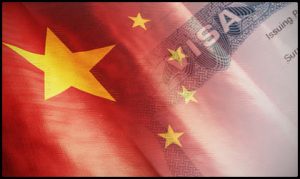
Global investment bank Credit Suisse Group AG has reportedly warned that Macau could see its aggregated gross gaming revenues crash by as much as 20% this year owing to China’s burgeoning crackdown on granting visas to frequent gamblers.
According to a Tuesday report from Asia Gaming Brief, the mainland’s National Immigration Administration revealed earlier this month that it had ‘discouraged’ approximately 90,000 people who had wanted to leave the country to gamble over the course of the last year. The source explained that the giant nation’s Ministry of Public Security has also recently stepped up its own associated efforts and is said to be concentrating on those who have visited a foreign casino more than three times since the start of 2019.
Rapid recession:
Credit Suisse Group AG has now reportedly detailed that such steps could likely negatively impact as much as 30% of the VIP and premium-mass aggregated gross gaming revenues earned by the over 40 casinos in Macau, which is equivalent to about 20% of the industry’s overall total. The financial services giant purportedly disclosed that it arrived at this estimate following discussions with industry participants including junket agents and operators alongside the appearance of allegations that regular Chinese gamblers are now regularly having their visa applications rejected.
Reportedly read a statement from Credit Suisse Group AG…
“In fact, tighter visa control is one of the key reasons for the slow recovery. Aggregated weekly gross gaming revenues for May have been disappointing and have fallen from $24.7 million during the ‘Golden Week’ holiday to $6.1 million last week.”
Faltering flow:
Credit Suisse Group AG reportedly divulged that this weekly tally was tracking at between $30.9 million to $37.1 million late last year before China upped its efforts at stopping domestic gamblers from travelling to overseas destinations, which include Macau.
Mitigation movement:
In response and the government for Macau reportedly  recently noted that it may add provisions into its under-consideration draft gaming bill that would reduce taxes for casino operators that can attract significant numbers of overseas tourists from outside of greater China. The former Portuguese enclave is home to some of the world’s largest and most famous gambling venues such as the iconic Casino Grand Lisboa from SJM Holdings Limited and currently charges every one of these facilities a 35% gross gaming revenues tax alongside smaller duties for every live dealer table, gaming machine and VIP room they operate to take the effective rate up to roughly 39%.
recently noted that it may add provisions into its under-consideration draft gaming bill that would reduce taxes for casino operators that can attract significant numbers of overseas tourists from outside of greater China. The former Portuguese enclave is home to some of the world’s largest and most famous gambling venues such as the iconic Casino Grand Lisboa from SJM Holdings Limited and currently charges every one of these facilities a 35% gross gaming revenues tax alongside smaller duties for every live dealer table, gaming machine and VIP room they operate to take the effective rate up to roughly 39%.
Futile force:
However, Credit Suisse Group AG reportedly predicted that such a move may ultimately prove ineffectual as non-Chinese tourists have historically constituted less than 8% of Macau’s foreign visitor pool while spending about two-thirds less on gambling. The global investment bank purportedly asserted that earnings before interest, tax, depreciation and amortization for the city’s casinos would increase by a mere 1.6% even in a ‘blue sky scenario’ where such punters constituted 10% of aggregated gross gaming revenues.
Gambling online in India refers to participating in online betting and casino games via websites or apps. The legal status of online gambling in India is somewhat complex and varies depending on the nature of the gambling and the specific state laws.
Many Indian players choose to use international online casinos and sportsbooks that operate legally in their home jurisdictions but may not be regulated under Indian law. These platforms are usually licensed by respected authorities.
Online gambling in India is not explicitly illegal, but its legality depends on state laws and the type of gambling activity. While international online casinos and sportsbooks cater to Indian players, the regulatory framework remains unclear, and players should exercise caution. It is always advisable to use licensed and reputable platforms to ensure a safe gambling experience.





